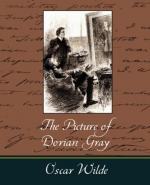And, yet, how vivid was his recollection of the whole thing! First in the dim twilight, and then in the bright dawn, he had seen the touch of cruelty in the warped lips. He almost dreaded his valet leaving the room. He knew that when he was alone he would have to examine the portrait. He was afraid of certainty. When the coffee and cigarettes had been brought and the man turned to go, he felt a mad desire to tell him to remain. As the door closed behind him he called him back. The man stood waiting for his orders. Dorian looked at him for a moment. “I am not at home to any one, Victor,” he said, with a sigh. The man bowed and retired.
He rose from the table, lit a cigarette, and flung himself down on a luxuriously-cushioned couch that stood facing the screen. The screen was an old one of gilt Spanish leather, stamped and wrought with a rather florid Louis-Quatorze pattern. He scanned it curiously, wondering if it had ever before concealed the secret of a man’s life.
Should he move it aside, after all? Why not let it stay there? What was the use of knowing? If the thing was true, it was terrible. If it was not true, why trouble about it? But what if, by some fate or deadlier chance, other eyes than his spied behind, and saw the horrible change? What should he do if Basil Hallward came and asked to look at his own picture? He would be sure to do that. No; the [45] thing had to be examined, and at once. Anything would be better than this dreadful state of doubt.
He got up, and locked both doors. At least he would be alone when he looked upon the mask of his shame. Then he drew the screen aside, and saw himself face to face. It was perfectly true. The portrait had altered.
As he often remembered afterwards, and always with no small wonder, he found himself at first gazing at the portrait with a feeling of almost scientific interest. That such a change should have taken place was incredible to him. And yet it was a fact. Was there some subtle affinity between the chemical atoms, that shaped themselves into form and color on the canvas, and the soul that was within him? Could it be that what that soul thought, they realized?—that what it dreamed, they made true? Or was there some other, more terrible reason? He shuddered, and felt afraid, and, going back to the couch, lay there, gazing at the picture in sickened horror.
One thing, however, he felt that it had done for him. It had made him conscious how unjust, how cruel, he had been to Sibyl Vane. It was not too late to make reparation for that. She could still be his wife. His unreal and selfish love would yield to some higher influence, would be transformed into some nobler passion, and the portrait that Basil Hallward had painted of him would be a guide to him through life, would be to him what holiness was to some, and conscience to others, and the fear of God to us all. There were opiates for remorse, drugs that could lull the moral sense to sleep. But here was a visible symbol of the degradation of sin. Here was an ever-present sign of the ruin men brought upon their souls.




